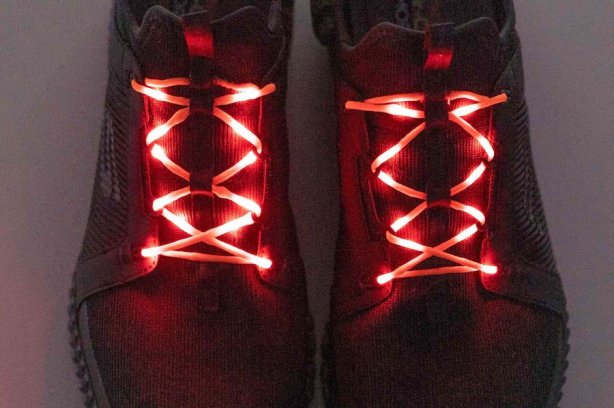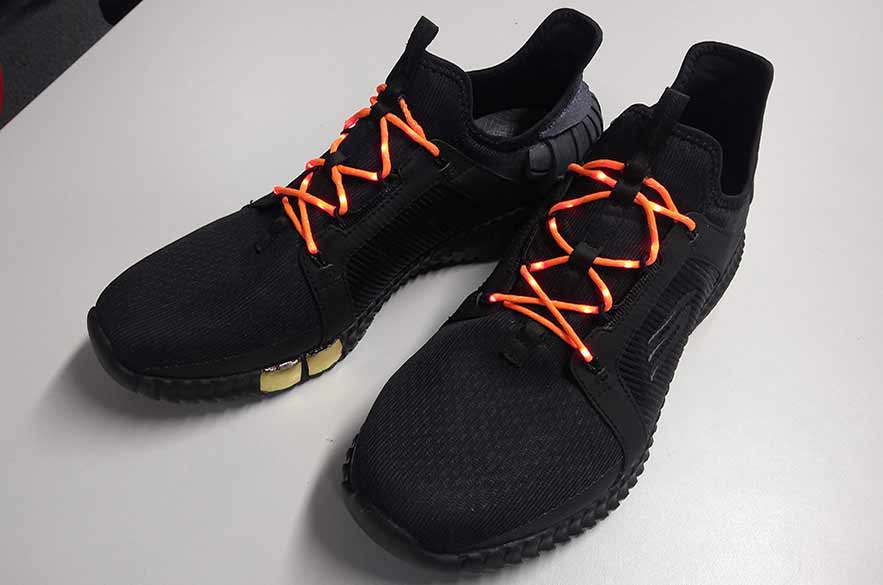
Trützschler expands Optima options
The innovative shoelaces contain light emitting diodes the size of a flea and are activated by the wearer tapping their shoes together.

15th December 2020
Innovation in Textiles
|
Nottingham, United Kingdom
Textiles experts at Nottingham Trent University have designed shoelaces that light up and flash to improve safety at night for joggers and cyclists. Created by researchers in the Advanced Textiles Research Group (ATRG) in collaboration with leading science and engineering company QinetiQ, the laces are also intended as a fashion accessory.
The braided shoelaces contain light emitting diodes (LEDs) ‘the size of a flea’ and are switched on or off by the wearer tapping their shoes together, ATRG says. As the LEDs are encapsulated in a waterproof resin, the laces are fully washable and wearable so they can be worn and used like any other pair of laces, the group adds.
“These laces could become a very simply way for runners or cyclists to improve their visibility on dark winter nights,” said Professor Tilak Dias, who leads the ATRG in the School of Art & Design.
The potential future integration of other technologies onto the lace itself really opens up a world of possibilities for large impact
“Not only that, but our contacts in industry believe that they could become popular as a fashion accessory and worn for aesthetic purposes, as well as safety reasons.”
The laces are powered by a small, integrated battery in the shoe which contains the electronics linked to the on/off sensor. The electronics in the shoe are also embedded in a silicone pod to protect them from the elements and to seamlessly incorporate them into the shoe's design.
According to ATRG, until the LEDs are switched on, they look and behave just like normal shoelaces, as the electronics cannot be seen by the naked eye and can barely be felt. Dr Theodore Hughes-Riley, of the ATRG, said: “This technology shows how smart textiles can improve safety for athletes, but also how it can be used as a fashion accessory.”
“This technology could become very appealing to the market soon, as our research into optimising the smart textiles manufacturing process will enable industry to take a huge step forward to producing these kinds of electronic textiles for the consumer.”

Roya Ashayer-Soltani, a materials scientist and textiles expert at QinetiQ, said: “The current laces have real potential to make a great difference to the healthcare, athletic, leisure, defence and security industries. The potential future integration of other technologies onto the lace itself really opens up a world of possibilities for large impact.”
Nottingham Trent University (NTU) was named University of the Year 2019 in the Guardian University Awards. The award was based on performance and improvement in the Guardian University Guide, retention of students from low-participation areas and attainment of BME students.
NTU was also the Times Higher Education University of the Year 2017, and The Times and Sunday Times Modern University of the Year 2018. These awards recognise NTU for its high levels of student satisfaction, its quality of teaching, its engagement with employers, and its overall student experience.
The university has been rated Gold in the Government’s Teaching Excellence Framework – the highest ranking available. It is one of the largest UK universities. With nearly 32,000 students and more than 4,000 staff located across four campuses, the University contributes £900m to the UK economy every year. With an international student population of more than 3,000 from around 100 countries, the University prides itself on its global outlook.
The university is passionate about creating opportunities and its extensive outreach programme is designed to enable NTU to be a vehicle for social mobility. NTU is among the UK’s top five recruiters of students from disadvantaged backgrounds and was awarded University of the Year in the UK Social Mobility Awards 2019.
A total of 82% of its graduates go on to graduate entry employment or graduate entry education or training within six months of leaving. Student satisfaction is high: NTU achieved an 87% satisfaction score in the 2020 National Student Survey, above the sector average of 83%.

Business intelligence for the fibre, textiles and apparel industries: technologies, innovations, markets, investments, trade policy, sourcing, strategy...
Find out more